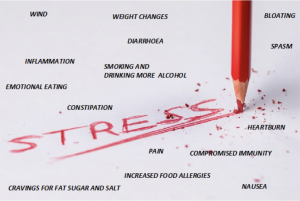Stress and Digestion

How does stress relate to digestion?
We easily recognise that stress affects the gut. We all get the common symptoms of butterflies in the stomach, or a need to go to the toilet, when stressed. But how much more dangerous is stress for the digestion than this? Many people would like to know if stress could really cause diseases like ulcers, cancer or inflammation of the gut. Those with IBS often recognise that stress worsens their symptoms – what can be done about this?
The normal feeling of nausea, abdominal gripes and need to go to the toilet urgently when we are stressed results from the close relationship between your brain and your gut. Many of the types of nerves are shared between the brain and the gut brain, known as the enteric nervous system. Some people even refer to this relationship as ‘Big brain, little brain’ or the ‘Gut-Brain Axis’. The two ‘brains’ talk to each other. I sometimes liken the relationship to a toddler and parent; whilst often caring and harmonious, the two can definitely wind each other up at times!
When we become stressed the body has what is called a ‘flight and fight’ reaction. This has a number of effects including increased movement in the gut and a reduction in blood flow, which is diverted to other organs. When the gut becomes stressed, perhaps by an infection, food intolerance, or change in bacteria then it also reacts with changes in movement and sendspain messages to the ‘big’ brain.
Summary of How Stress Affects the Gut
Effect of Acute Stress ‘Flight or Fight’
- Stress hormones increase
- Heart beat increases
- Blood vessels constrict
- Blood pressure increases
- Blood glucose levels increase
- Breathing rate increases
- Perspiration increases
- Changes to stomach acid levels
- Changes to digestive muscle contractions
Effect of Chronic (longer term stress)
- Hormonal imbalance
- Digestive muscles are affected
- Gastric secretions affected
- Changes to enzyme activity
- Changes to gut bacteria
- Possible increased risk of inflammation
What is Stress?
We all worry that excessive stress will make us ill. It is important to remember that stress is the way we respond to the environment, not necessarily reflecting the world around us. Some normal people don’t get stressed when climbing high mountains or speaking in front of thousands of people. Other people, also entirely normal, find shopping in a supermarket, driving a car or talking to their boss, very stressful. Stress is the response we have to the environment not the external stimulus.
Stress responses are a normal part of being human and help protect us from harm. As humans evolved thousands of years ago the early people that were anxious enough to run away from predators survived to have more children, and the chilled out cavemen didn’t! So some degree of feeling stressed is both normal and part of a healthy life.
Does Stress Cause Gut Disease?
There is no doubt that excessive stress makes gut symptoms worse. This is particularly true of conditions where the nerves in the gut are responsible for most or all of the symptoms. These are the so-called ‘functional disorders’ such as IBS, indigestion that is not caused by ulcers and some forms of food intolerance. We now also recognise that being exposed to stress in early life can result in changes to gut bacteria and this results in the nerves functioning poorly. The scientific knowledge in this interesting area  is increasing rapidly.
is increasing rapidly.
Stress also plays a part in worsening certain gut diseases such as inflammatory bowel disease (Colitis and Crohn’s disease, peptic ulcers and gastroesophageal reflux disease (GORD). Fortunately the effect seems fairly small but it is definitely there. There has also long been a concern that stress increases our risk of cancer. Scientists have not been able to show a very strong link here but this possibility is another reason for actively addressing a high stress level.
The different ways in which the gut can be affected by stress is shown below:
Stress and Digestion – some figures!
Gut Bacteria and Stress
There is evidence from animals and humans that stress causes changes in the gut bacteria. Studies have also shown that stress changes the bacteria in animals and patients with depression have different bacteria to those without. Giving good bacteria to animals decreases stress responses but we do not have clear evidence yet that the same is true in humans. There is much more work to be done in this area, though. It is true that eating a diet high fibre, fruit and vegetables is associated with lower degrees of mental illness in adults and adolescents.
How can we avoid stress-induced gut problems?
Managing stress often requires looking at changes in a number of aspects of life-style as well as using individual techniques to induce relaxation.
Actions to Reduce Stress
Don’t hide things away. Talk to loved ones, talk to your doctor or therapists. There are plenty of benefits to be had from opening up and thinking about yourself, your health and your future.
Therapy in the form of meditation or yoga (or whatever relaxes you) has shown benefits to those experiencing stress-related bowel conditions such as constipation or diarrhoea.
Specific activities that can help:
- Training in relaxation, meditation, or stress management, e.g. mindfulness
- Counselling or talking therapy, e.g. Cognitive Behavioural Therapy (CBT)
- Medications for depression or anxiety – discuss this with your doctor
- Regular gentle exercise – releases endorphins – which improves mood
Dietary Changes to Reduce Stress
Stress relief or avoidance is individual, but eating regular meals which include a diet high in fibre, fruit and vegetables is a good idea if these foods do not cause symptoms.
Practice ‘Mindful eating’ which is simply the act of being aware of engaging all our senses—the taste, the smell, the texture— in every uninterrupted morsel of food. It’s about knowing where your food comes from and acknowledging the emotions that guide eating behaviours. Understanding this may help to identify the stress signals that can lead to unhealthy food habits. The goal of ‘mindful eating’ is to support a shift from focusing on external thinking about food to explore the eating experience itself.
Eating too fast and ‘on the go’ can leave us stressed and wanting more food, thus contributing to obesity.
Try to make time for positive healthy eating practices in your day including take your time, taking small healthy meals in a pleasant eating environment and remember to chew your food! Aim for 20 chews per mouthful. Then the brain will realise you have had a proper meal and will be less likely to demand that after-dinner chocolate chip cookie! ☺
Avoid excessive alcohol intake – this affects our sleep and makes us more depressed. Caffeine likewise can make us more stressed and can stop us sleeping properly, especially if taken later in the day . Try to consume all caffeinated drinks before midday do and do read our blog on Caffeine for more information on this topic.
Moderation is very important (i.e. a balanced diet – check out our Mediterranean Diet blog).
Keeping well hydrated particularly in the warm summer months, along with the above recommendations helps your cause, also.
Authorship
This blog is written by a student dietitian and a gastroenterologist as an overview of a complex and fascinating subject.
For more in-depth reading we suggest the following:
https://www.nhs.uk/Livewell/digestive-health/Pages/lifestyle-tips.aspx
https://www.elsevier.com/about/press-releases/research-and-journals/stress-affects-the-balance-of-bacteria-in-the-gut-and-immune-response
https://www.medicalnewstoday.com/articles/321177.php
http://theconversation.com/gut-feeling-how-your-microbiota-affects-your-mood-sleep-and-stress-levels-65107
For those looking for a more academic approach:
https://www.sciencedirect.com/science/article/pii/S2352289516300509
Useful apps you may find helpful in reducing stress levels and encouraging relaxation:
www.headspace.com
www.calm.com
0 Comment


Leave a Reply